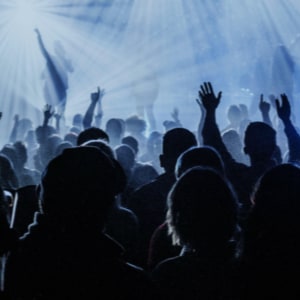A former burlesque house built in 1870, Philadelphia's Trocodero Theatre, with its winding candles dotting the balcony and massive, domed roof, was the perfect place for Peter Murphy, the progenitor of goth, to present his Mr. Moonlight tour wherein he performed an all-Bauhaus set. In contrast to his more casual solo material shows, on May 10, 2013, Peter Murphy and his solo band treated the Bauhaus material with great reverence while still applying a new angle to the songs.
Fittingly, the show opened with the stage completely soaked in darkness. Surprisingly, the band opened with the celtic-meets-moorish acoustic folk song of "King Volcano." As the light grew brighter onstage, the band then segued into another acoustic number, "Kingdom's Coming," which despite being about thirty years old, felt like it was written around 300 A.D. The opening selection was a wise one, exhibiting one of the things Murphy does best–mood setting. Instead of opening with one of "the hits," Murphy set the stage with a creeping intonation that grew in energy and forced the audience to focus on the stage.
When the band did break into the massive "Double Dare," the wall-sized, infinitely black riffs where that much heavier and that much darker. The band were energetic but punkishly raw while Murphy, who still looks fantastically vampiric, crept around the stage, using the stage lights to highlight his impossibly high cheekbones and dark eyes while he called out the songs refrain, changed from "They never take the dare" to "YOU never DARE to dare."
Throughout the night, Murphy made it a point to mention that the Peter Murphy solo band were not Bauhaus and they were not trying to be. The disclaimer was clever, in that it allowed the band to do things that Bauhaus usually avoided. I never got a chance to see Bauhaus live but judging from live recordings, it seemed that the band were impossibly massive, but very structured live. In contrast, when the Peter Murphy solo band played Bauhaus material to an audience of about 500, the songs seemed more immediate and tactile. Bauhaus definitely seem to be more huge in sound, but the Murphy band seemed to embrace the live performance, allowing the music to be more spontaneous. Murphy too seemed more willing to experiment and allow randomness to enter the show: In contrast to the perfect, soulful crooning heard on Bauhaus' live albums, Murphy was more dynamic–deathly quiet on the quiet parts and more savage on the screams, at times reaching the frenzy created by Iggy Pop on Fun House. Frankly, it was a real treat to see these songs in such an intimate environment.
As the band crossed the Bauhaus catalog, playing an extended set that covered both the better-known songs such as "Stigmata Martyr," "God in an Alcove" and "Bela Lugosi's Dead," as well as rare tunes such as "Burning from the Inside" and "All we ever Wanted was Everything," they allowed themselves to experiment with the songs and make references that longtime fans could appreciate. The real gem of the evening was a phenomenally extended "She's in Parties" which the band began as its normal version, only to morph it into the dub version, only to extend it into another dub version where Murphy referenced the band's appreciation of Jamaican sonic experimentation by shouting "Jah Rastafari" and playing a zonked out melodica. Wow! Likewise, Murphy himself handled the trippy effects on "Bela Lugosi's Dead" and pushed the song to its limits so that it became both a chilling groove as well as a Captain Beefheart-style consideration of sound itself.
The show ended with a few surprises. Although Murphy eschewed being labeled as "goth" for a number of years, he has recently begun to accept the title thrust upon him, and perhaps in a nod to the title, performed a cover of Dead Can Dance's "Severence." For the show's finale, the band played the Bauhaus version of Bowie's "Ziggy Stardust." It was a fitting end because throughout the show, Bowie's influence on Murphy was apparent. Certainly, Murphy added his own orignal elements to his style and lyrics, but that famous Bowie style from the mid-'70s, where choruses are extended through a powerful diaphragm and thick vocal chords, only to slowly drift away into nothingness, was definitely at least part Ziggy.
As is Murphy's style, the very end of the show ended with a clever, but tantalizing stop. Where "Ziggy Stardust" ends with the line "..and Ziggy played⦠guitarrrrr," Murphy sang the line "â¦and Ziggy playedâ¦" and then paused until the band drifted into silence. Murphy paused some more, took a few poses, and then just when it seemed like he had drawn out the song to it's utter maximum length, and just when it seemed like he was going to sing the maddening final word, the band uniformly and quickly left the stage, leaving the audience wanting more, if only that one final word.
Notes:
-Although the audience was completely enraptured during the ninety-five minute show, in a show of true Philadelphian class, they began to yell "Asshoooole!" when the band did not return for an encore. First, why not just enjoy the show for what it was, instead of letting no encore ruin the evening. Second, the encore is arbitrary. Had Murphy left before Ziggy, and then returned and played Ziggy, people would have been none the wiser. Third, I took Murphy's declination of saying the very last word of "Ziggy Stardust" and lack of encore as a pretty neat artistic statement and experiment in anticipation. Do people not get that?
-Seriously, yo. If you like Murphy or Bauhaus, this is NOT a show to miss.
-I mean, really, all clothing "styles" are arbitrary and sort of silly if you think about it. But, really, if you are gonna style it up, I think the goth style looks pretty cool.
